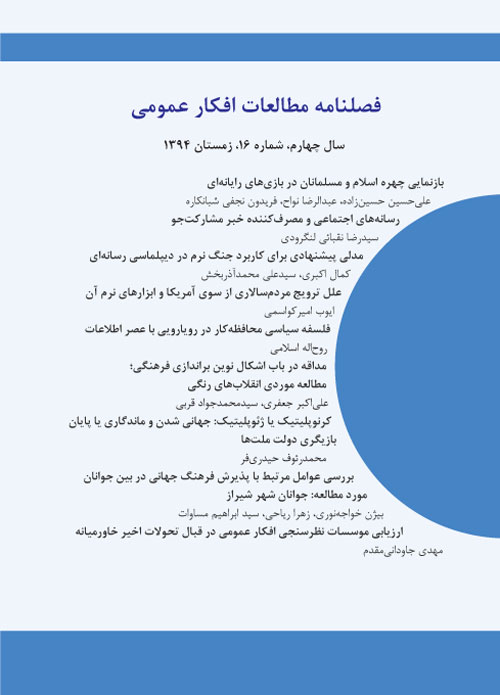فهرست مطالب

فصلنامه مطالعات افکار عمومی
پیاپی 4 (زمستان 1391)
- تاریخ انتشار: 1392/01/20
- تعداد عناوین: 6
-
Page 9In modern societies, the fascinating aspects of material life, luxuries and the accumulation of material assets are of great importance. People try hard to achieve a high social and economic status, and individualism and rationalism play a key role. In the present descriptive study, the documentary research method is used to study and analyze the ideas and works of Georg Simmel. It should be pointed out that, while achievements of modern societies have some positive points (technological advances, comfort and speed), they have severed the bonds that connected the individual with his past and thethings that belong to him - such as relatives, friends and family.Keywords: Simmel, alienation, city, modernity, man
-
Page 41In modern industrial societies, universities, in addition to functions such as production of knowledge (research), transmission of knowledge (education), dissemination of knowledge (services) and shaping the direction of culture, are the main sources of scientific and technological evolutions, and socio-cultural movements in the social, economic, political and cultural relations of society. They also provide different social, economic, political and cultural sectors with expert human resources. Various needs of different sectors of the country, on the one hand, and the gap between the function of Iranian universities and the objectives of the Islamic Republic of Iran, on the other hand, have made it a necessity to deal with the concept of university cultural engineering. Cultural engineering as a strategic approach is capable of addressing this need. The present article seeks to explicate and define the necessities for this purpose and theorize about university cultural engineering.Keywords: culture, university, engineering culture, cultural engineering
-
Page 71The French people experimented with some different political systems before the Revolution. The conflict between the government and the parliament over their powers, has been one of the most important challenges. This historical conflict has had inconsistent results. The supporters of the government or the parliament have provoked riots and revolutions, changed the constitution and stabilized their positions in different eras. At some points in the political history of the country, the two parties tried to establish an intermediate political system to bring the conflict to a conclusion with a win-win result. However, General de Gaulle used his charisma and status to end this conflict to the advantage of the government. The French have experienced a system, for more than 50 years, in which the parliament has been driven to the margin. The roots of this historical conflict are discussed in the present article.
-
Page 105The present article seeks to highlight the most important turning points in the history of international relations, and explicate the grounds for their emergence. Also the following questions are addressed in this article: at what stages has the gap between the world political systems and the basic theoretical principles been substantial? What have been the possible turning points in the international relations and how have they influenced the world? And what have been the reactions of world powers to these turning points in the international relations and currents? To address these questions, a scientific-historical approach is adopted to the changes occurred in world system, and the characteristics of these events and their outcomes are discussed. Also, the role of Islamic Revolution’s discourse and the Islamic awakening uprisings are analyzed.Keywords: the dissolution of empires, cold war, the collapse of USSR, September 11, Islamic Awakening
-
Page 135Martin Heidegger is one of the prominent philosophers who has turned modernity into a fundamental issue for human beings and has found a truly ontological issue in it. Heidegger’s philosophy has an ontological and phenomenological nature, that is to say, it discuss the ontological principles of modernity; therefore, his philosophy is one of the deepest philosophies, in this regard. He has tried to free modernity from the subjective and instrumentalist conceptions and has turned it into one of basic questions of man. He has criticized modernity strongly and through a phenomenological method has tried to answer the question, what is being?Keywords: transformation in science, modernity, Being, Time, Heidegger
-
Page 169The perfect man possesses all possible perfections, is the manifestation of all divine attributes and reveals this harmony better than other creatures. In the Battle of Uhud, in spite of suffering severe hardship, Prophet Mohammad (S) declined to curse the enemies who had caused the suffering, and said “I am not sent as a prophet to curse(people), I am sent to call (them) unto God and disseminate blessing”. In his prayer Prophet Mohammad (S) asked God to “guide my people to truth, because they are ignorant”. The perfect man has been described in different ways: Buddha calls him “Arhat” and Confucius attributes the name “Chun-tzu” to him. In Yoga and Bhakti he is called the “free man”. Plato calls him “philosopher”, Aristotle names him “dignified man” and Nietzsche gives the name “superman” to him. In Islamic mysticism and Sufism different names are given to the prefect man: Qutb al-Aqtab, Ghawth al-Azam, jame’ Caliph of Allah and the like.Keywords: anthropology, perfect man, humanism, mysticism


